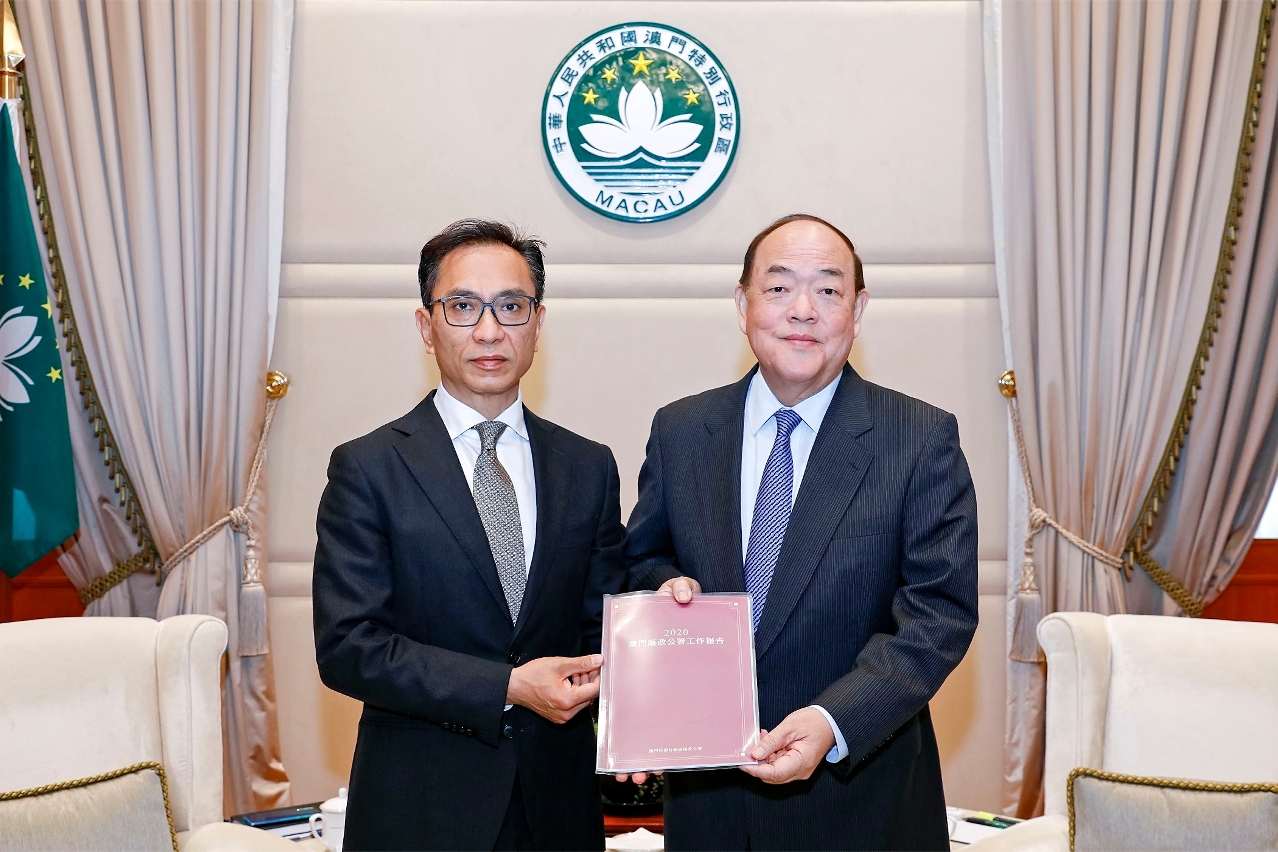 The Commissioner Against Corruption, Chan Tsz King, submitting the 2020 Annual Report of the CCAC of Macao to the Chief Executive, Ho Iat Seng.
The Commissioner Against Corruption, Chan Tsz King, submitting the 2020 Annual Report of the CCAC of Macao to the Chief Executive, Ho Iat Seng.
The 2020 Annual Report of the Commission Against Corruption of Macao was published in the Official Gazette of the Macao Special Administrative Region today (20 May). In 2020, under the pandemic, the CCAC still carried out the actions in the areas of anti-corruption, ombudsman and promotion and education in a pragmatic and orderly way in accordance with its plan.
Regarding anti-corruption work, last year there was an increase in the corruption cases related to securing job opportunities. The CCAC handled several cases of corruption in the private sector in which active or passive bribery was used as the means for securing a job, contract renewal or promotion. Such cases mainly occurred in gaming, security and construction companies. The suspects included local and mainland Chinese workers as well as non-resident workers from some Southeast Asian countries. In addition, among the 18 cases referred to the Public Prosecutions Office, eight involved fraud over public funds or document forgery related to fraud. The CCAC states that the fact that the number of such cases remained high has made “strengthening the supervision on government subsidies” a buzzword. Fortunately, following years of efforts, the CCAC sees that the relevant authorities are taking actions proactively, which has promptly suppressed the fraudulent acts which were rampant for some time. The CCAC hopes that public departments and all kinds of public funds will take immediate action to promote the development of corruption prevention mechanism for government subsidies. They should develop a dynamic and long-term corruption prevention mechanism which is all-round and comprehensive through prior estimation, inspection throughout the process and examination afterwards in order to best ensure reasonable use of public funds.
Regarding the work of the ombudsman, the CCAC concluded the “Investigation report about 74 land concession leasehold case files where the provisional concession leaseholds were declared expired” and the “Investigation report on the granting of loans to Viva Macau Limited by the Industrial and Commercial Development Fund”. To plug the loopholes in the vetting and approval as well as supervision of public assets, the CCAC not only presented suggestions for improving the supervision mechanism for the use of financial aid but also held meetings with different funds where it gave explanations and clarifications on the management of public assets. In addition, the CCAC continued to investigate each case that fell within the ombudsman’s work with a pragmatic attitude and carefully verify the existence of administrative illegalities and irregularities in the decisions made and procedures carried out by the public services or entities. It is encouraging that the CCAC obtained the collaboration of all these services and entities in the course of the investigations. The suggestions or recommendations presented after the investigations were all accepted by the services or entities concerned. Some of them made commitments proactively and even took corrective or improvement measures immediately. Although there is still room for improvement, all this shows that the Macao SAR Government is willing to face the problems related to administrative procedures or acts highly concerned by the society and citizens. The courageous attitude to improve governance deserves recognition and praise. The CCAC also pointed out that the “retrospective review” mechanism mentioned in Policies and Measures was put into practice last year so as to strengthen the effectiveness of subsequent monitoring of cases and to urge public services to continue to look squarely and monitor seriously any existing problems. The CCAC hopes that it is able to, through this mechanism, effectively respond to the society’s expectations on continuous inspection and promotion of integrity building in the Macao SAR.
In 2020, the CCAC received a total of 479 complaints and reports. Along with the cases intervened by both the Anti-Corruption Bureau and the Ombudsman Bureau as well as those filed for investigation on the initiative of the judicial bodies which were then referred to the CCAC, there were a total of 491 cases. Among them, 105 cases were passed to the Anti-Corruption Bureau for follow-up and 282 cases were passed to the Ombudsman Bureau. There were 100 cases which failed to meet the conditions to be filed for investigation and thus had to be archived directly because the facts were not clear or the information provided was seriously inadequate. Also, four cases were referred to other departments for handling as they significantly fell within the jurisdiction of such departments. The CCAC pointed out that, last year the proportion of anonymous complaints or reports received was fewer than that in the past, which accounted for only 34% of the overall complaints and reports, down by more than 20% compared to 54.6% in 2019. Real-name complaints and reports, on the other hand, increased to nearly 60%, reflecting that the promotion work of the CCAC had achieved initial results and the citizens had a growing awareness of lodging real-name complaints and reports.
On the front of promotion and education, in the light of the pandemic, most of the seminars and public events in the first half of 2020 were cancelled and postponed. However, the CCAC still held a total of 303 seminars and talks targeting at public servants, employees of private companies, ordinary citizens, students of higher education institutions, secondary, primary schools and kindergartens in the year. Also, an array of educational activities about integrity and honesty were held. Regarding exchange and cooperation, despite the worldwide impact of the pandemic, the CCAC continued to maintain good communication with relevant associations in other countries or regions through online platform, including holding a videoconference with the experts of the Implementation Review Group for the United Nations Convention against Corruption. After the pandemic had subsided, the CCAC resumed necessary visits, including visits to counterpart bodies such as the National Supervisory Commission in Beijing and liaised with the nine cities in the Greater Bay Area for the preparatory work of the official visit which took place in early 2021.
The Annual Report has been submitted to the Chief Executive, Ho Iat Seng, in accordance withtheOrganic Law of the Commission Against Corruption of the Macao Special Administrative Region. It also includes summaries of some of the criminal cases and administrative complaints.


